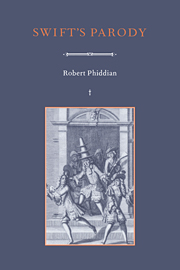Book contents
- Frontmatter
- Contents
- Acknowledgments
- List of abbreviations
- Introduction
- 1 Theoretical orientations
- 2 Restoration enterprises and their rhetorics
- 3 Parody and the play of stigma in pamphlet warfare
- 4 The problem of anarchic parody: An Argument against Abolishing Christianity
- 5 Authority and the author: the disappearing centre in Swiftian parody
- 6 Entrance to A Tale of A Tub
- 7 A Tale of A Tub as an orphaned text
- 8 A Tale of A Tub as Swift's own illegitimate issue
- Conclusion: parodic disguise and the negotiability of A Tale of A Tub
- Select bibliography
- Index
2 - Restoration enterprises and their rhetorics
Published online by Cambridge University Press: 29 September 2009
- Frontmatter
- Contents
- Acknowledgments
- List of abbreviations
- Introduction
- 1 Theoretical orientations
- 2 Restoration enterprises and their rhetorics
- 3 Parody and the play of stigma in pamphlet warfare
- 4 The problem of anarchic parody: An Argument against Abolishing Christianity
- 5 Authority and the author: the disappearing centre in Swiftian parody
- 6 Entrance to A Tale of A Tub
- 7 A Tale of A Tub as an orphaned text
- 8 A Tale of A Tub as Swift's own illegitimate issue
- Conclusion: parodic disguise and the negotiability of A Tale of A Tub
- Select bibliography
- Index
Summary
Perhaps no writer can easily be found that has borrowed so little, or that in all his excellencies and all his defects has so well maintained his claim to be considered as original.
The burden of the past and a definition of restoration enterprise
That most self-conscious of public shapers, Joseph Addison, urbanely uncovers the central anxiety of his culture when he explains his purpose as an essayist in The Spectator no.262:
Among those Advantages, which the Publick may reap from this Paper, it is not the least, that it draws Mens Minds off from the Bitterness of Party, and furnishes them with Subjects of Discourse that may be treated without Warmth or Passion. This is said to have been the first Design of those Gentlemen who set on Foot the Royal Society; and had then a very good Effect, as it turned many of the greatest Genius's of that Age to the Disquisitions of natural Knowledge, who, if they had engaged in Politicks with the same Parts and Application, might have set their Country in a Flame. The Air-Pump, the Barometer, the Quadrant, and the like Inventions, were thrown out to those busy Spirits, as Tubs and Barrels are to a Whale, that he may let the Ship sail on without Disturbance, while he diverts himself with those innocent Amusements.
In his measured way, Addison acknowledges the darkest fear of late Stuart England, the recent spectre of the ‘Country in a Flame’.
- Type
- Chapter
- Information
- Swift's Parody , pp. 24 - 51Publisher: Cambridge University PressPrint publication year: 1995



